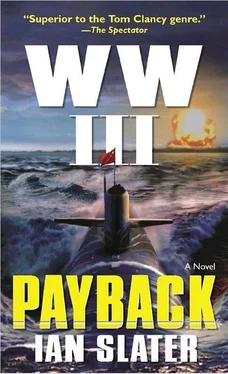With General Douglas Freeman it was Margaret’s apparently innocuous remark about the onions that hinted to him the first part of a possible connect. What the other half was, he didn’t know, only that he had the sense that whatever it was, it was important.
Some people, Riefelmann wrote in his seminal paper, “Explanations for the Reverse Connect,” attributed the source of their “moment of connect recognition” to God, others to fate, others to extrasensory perception, others to the phenomenon of remote viewing. The precise neurological trigger, however, remained obscure in much the same way that Western clinical trials showed that Chinese acupuncture, as practiced for millennia by the Chinese, clearly worked, while the neurological explanation continued to evade clinicians.
Ironically, Freeman, though well read in all things military, had never heard of Dr. Riefelmann. All he knew, like those who benefit from acupuncture without knowing anything of complex explanatory theories, was that Margaret’s comment about the Walla Walla onions had had a definite effect on him.
“You ever heard of Walla Walla?” he asked Agent Grant.
“Walla—?”
“Walla Walla.”
“No,” she said, daring to add, “Sounds kind of funny!”
It did sound funny, but Freeman was thinking “funny peculiar,” not “funny ha-ha!” arrested by the conviction, as Patton had been by his dream, that whatever the connection was, it transcended the merely personal and was of enormous significance in the MANPAD imbroglio.
As they slowed for the light by Custom House Plaza, Freeman’s cell phone was ringing.
“Excuse me,” he told Patricia, who was looking apprehensively around. Stopping at lights wasn’t something the FBI or any other of America’s security agencies cared for. Stationary targets.
“Freeman,” he said, flipping down his cell’s mouthpiece.
It was a familiar husky voice, speaking much more slowly than the nation usually heard her. “Douglas?”
“It is.”
“Oh.” There was a pause. “You’ve got someone with you.”
“Yes.”
“Not the jealous little hussy I got at your other number?”
Marte Price’s description of Margaret as a “little hussy” elicited a wry smile from the general. “No — another one,” he told her.
“My, you’re quite the old stoat, aren’t you?”
“ Old? You mean compared with all those adolescent gofers you have satisfying your every whim?”
“Not every whim, General. Now and then I like someone with experience.”
“Hmm. What do you want, Marte?”
Marte . Agent Grant recognized the famed CNN voice the general was sparring with. Maybe he’d let Marte Price’s name slip, thought Patricia, hoping that FBI agent Grant would be impressed. She was. And she could tell the blond newscaster was using flattery to pump the general for a scoop on what was being done behind closed White House doors about the MANPAD problem.
“I know,” Marte told the general, “that you’ve been summoned to Monterey’s FBI office. Which, I’d say, means your girlfriend at the White House wants to get you on scrambler-secure. Hush-hush. I’d guess they’re going for a counterstrike and they want an old four-star’s view on the proposed DA. Right?”
God, it was great to be in the game again, he thought. Well, all right, not exactly in the game, but at least advising the manager/owner in the box on the play.
The car stopped at another yellow light, and the general decided to have a little fun — an escape from the damn onions going around and around in his head like a song you’ve heard and just can’t evict. “Proposed DA?” he replied, affecting confusion. “I know nothing about district attorneys.”
“Very droll, Douglas.” She knew he knew she meant a Direct Action mission: to go in, cause maximum damage, and get out. Fast. “I know it won’t be for a month or two but—”
“I know nothing,” he said truthfully. “And quite frankly, I’m surprised you’re using a cell. Hardly secure, is it, given your eavesdropping competition, not to mention national security.” In fact, the general wasn’t at all surprised; an anchor with Marte’s clout hadn’t got where she was in the shark-infested waters of network and cable TV without taking risks, and the fact remained she had been able to help him in the past. And with the number of enemies he had in Washington, D.C., an IOU from the press was never a bad investment. Also, he knew she never broke her word.
“If I can,” was all he’d promise, “I’ll tell you.”
“Exclusively?” She paused. “Bamboo in the wind.” It wasn’t a question but a promise — the expression they had both learned during U.S. interventions in Southeast Asia, the phrase describing what the Italians called “fellatio.” Her brazenness took him aback. For all his sudden enjoyment with Margaret, he, like so many of the senior officer corps, was inherently conservative in discussing matters of sex. Marte must have sensed his shock at her openness. “Douglas?”
“I’m still here.”
“What do you call a man who likes sex?” she asked, then answered her own question. “Normal. Now, what’s a woman who likes sex? A slut, right?” Her old joke about the double standard between the sexes was lightheartedly delivered, but there was an edge to it nevertheless, the resentment of centuries of women.
His answer was from the heart. “I have never thought of you that way. And I never will.”
“Thank you,” she said. “You’re a very sweet man. I hope we see each other soon.”
He was about to say, “Me too,” but saw Patricia Grant smiling. “I’ll tell you whenever I’m cleared to do so,” he said, adopting a slightly censorious tone and flipping the mouthpiece shut.
As the car slid into its reserved spot, Patricia Grant exited with relief. It had been a simple pickup and delivery for her, its sheer uneventfulness a luxury in this war where “sleeper cells” were daily being ordered out of their hibernation to launch another murderous attack against innocent U.S. citizens, resulting in workloads for agents that pushed law enforcement personnel to the limits of endurance. On top of responding to ever-changing threat levels, they were required to keep tabs on illegal immigrants, which in itself was a full-time job.
On the way up to the regional DHS/FBI/CIA liaison conference room, Freeman was wondering first if he would be talking to one of Eleanor Prenty’s aides on a conference call, given that as National Security Advisor she must be exhausted, having been on her feet continuously since the attacks.
Before going in, he asked Patricia Grant whether he could use her PC to send an e-mail to Choir Williams, who, although he lived farther north in Washington State than Walla Walla, could do an IPS, intel profile search, about the place, vis-à-vis any possible connect between it and the terrorist attacks. The general knew little about the town in the wine-growing area in south-central Washington State other than that it was on the Walla Walla River near the Oregon border, and that it lay in the rain shadow east of the snow-crested Cascade mountain chain. He was aware that the latte legions in Seattle thought of Walla Walla as the back of beyond, like New York thought about the rest of the country.
After the comfortable warmth of the car, the conference room, to which only Patricia Grant and Freeman were allowed entrance, felt like a sauna. Yet he noticed Patricia Grant didn’t remove her jacket, the redhead apparently in slavish obedience to the FBI’s attempt to reinstate a strict dress code.
A second later the general understood the real reason for her obvious tension. The President of the United States appeared on the teleconference screen.
Читать дальше












